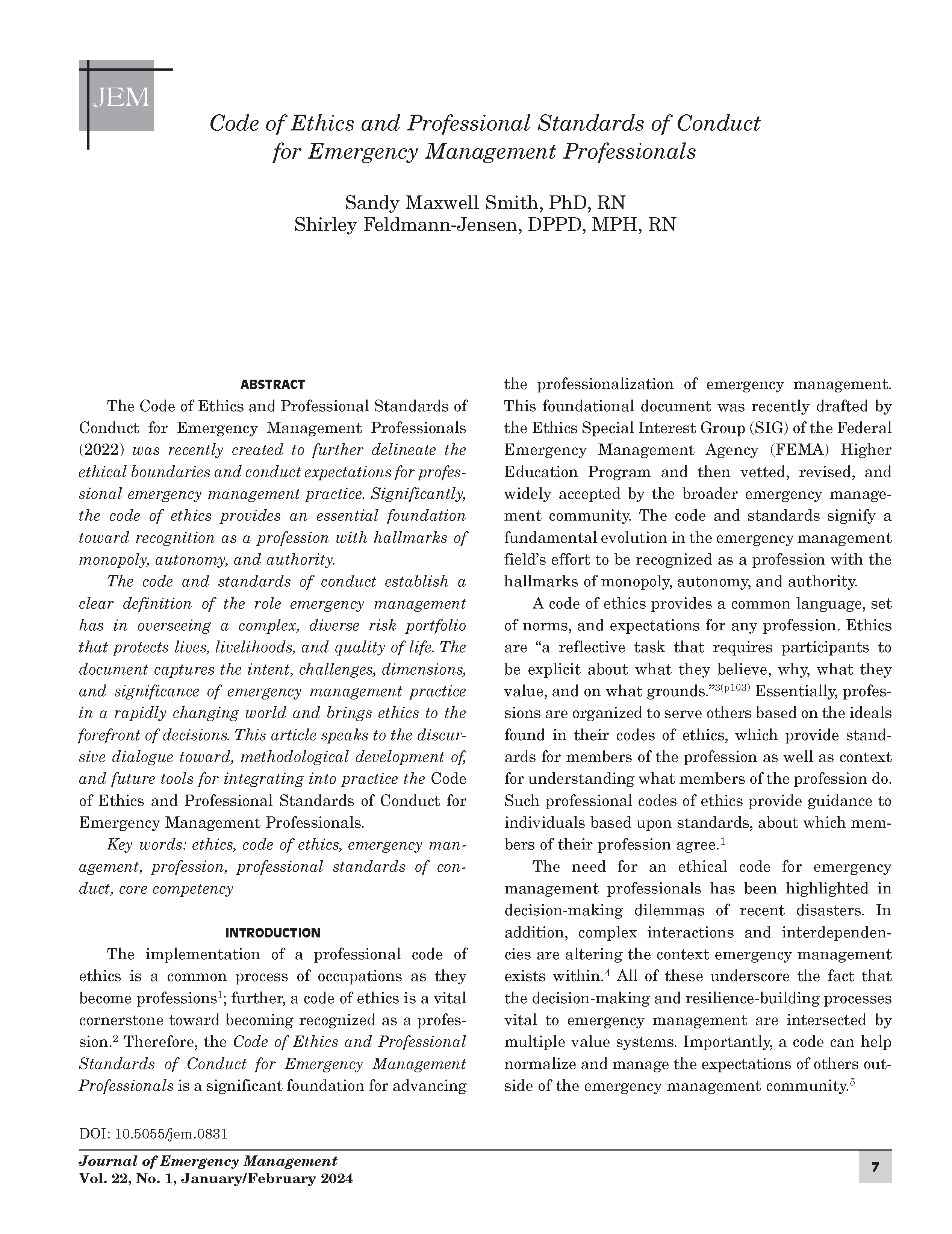Code of Ethics and Professional Standards of Conduct for Emergency Management Professionals
DOI:
https://doi.org/10.5055/jem.0831Keywords:
ethics, code of ethics, emergency management, profession, professional standards of conduct, core competencyAbstract
The Code of Ethics and Professional Standards of Conduct for Emergency Management Professionals (2022) was recently created to further delineate the ethical boundaries and conduct expectations for professional emergency management practice. Significantly, the code of ethics provides an essential foundation toward recognition as a profession with hallmarks of monopoly, autonomy, and authority.
The code and standards of conduct establish a clear definition of the role emergency management has in overseeing a complex, diverse risk portfolio that protects lives, livelihoods, and quality of life. The document captures the intent, challenges, dimensions, and significance of emergency management practice in a rapidly changing world and brings ethics to the forefront of decisions. This article speaks to the discursive dialogue toward, methodological development of, and future tools for integrating into practice the Code of Ethics and Professional Standards of Conduct for Emergency Management Professionals.
References
Davis M: Thinking like an engineer: The place of a code of ethics in the practice of a profession. Philos Public Aff. 1991; 20(2): 150-167.
Backof JF, Martin CL: Historical perspectives: Development of the codes of ethics in the legal, medical and accounting professions. J Bus Ethics. 1991; 10(2): 99-110.
Upshur REG: Principles for the justification of public health intervention. Can J Public Health. 2002; 93(2): 101-103.
Feldmann-Jensen S, Jensen SJ, Smith SM, et al.: Toward a substantive dialogue: The case for an ethical framework in emergency management, part 1. Australas J Disaster Trauma Stud. 2016; 20(1): 45-47.
Cwiak C: Emergency management: Our strengths. Our weaknesses. Our future [conference session]. In International Association of Emergency Managers Reimagined Encore Virtual Conference, June 7-8, 2021. Available at https://www.iaem.org/events/encore/program. Accessed May 2, 2023.
The World Medical Association: Medical Ethics Manual. Voltaire Cedex, France: World Medical Association Inc. 2005.
Etkin D: Emergency management code of ethics [conference session]. In Federal Emergency Management Agency Higher Education Symposium 17th Annual, June 1-4, 2015, Emmitsburg, MD, United States.
Sylves RT: Disaster Policy and Politics: Emergency Management and Homeland Security. Washington, DC: CQ Press, 2008.
Feldmann-Jensen S, Jensen SJ, Smith SM: The Next Generation Core Competencies for Emergency Management Professionals: Handbook of Behavioral Anchors and Key Actions for Measurement. Washington, DC: FEMA, 2017.
Zack N: Ethics for Disaster. Lanham, MD: Rowman & Littlefield Publishers, 2009.
Etkin D: The Ethical Emergency Manager: Issues, Morality and Dilemmas. 3rd ed. 2022. Toronto, Canada: David Etkin.
Etkin D, Feldmann-Jensen S, Smith SM, et al.: Toward a substantive dialogue: The case for an ethical framework in emergency management, part 2. Australas J Disaster Trauma Stud. 2016; 20(1): 50-53.
FEMA: The next generation emergency management core competencies. 2016.
Sepp C, Ronk C: Ethics and the emergency manager: A role that places emergency managers as leaders [course description]. In International Association of Emergency Managers Reimagined Encore Virtual Conference. 2021. Available at https://www.iaem.org/Portals/25/documents/2021/Ethics-and-the-Emergency-Manager.pdf. Accessed December 14, 2023.
Geale SK: The ethics of disaster management. Disaster Prevent Manag. 2012; 25(4): 445-462.
Frankel MS: Professional codes: Why, how, and with what impact? J Bus Ethics. 1989; 8: 109-115.
Etkin D, Timmerman P: Emergency management and ethics. Int J Emerg Manag. 2013; 9(4): 277-29. DOI: 10.1504/IJEM.2013.059866.
Alejandro A: Reflexive discourse analysis: A methodology for the practice of reflexivity. Eur J Int Relat. 2021; 27: 150-174.
Davis M: Eighteen rules for writing a code of professional ethics. Sci Eng Ethics. 2007; 13: 171-189. DOI: 10.1007/s11948-007-9000-2.
Breakey H: Harnessing multidimensional legitimacy for codes of ethics: A staged approach. J Bus Ethics. 2019; 170: 359-373. DOI: 10.1007/s10551-019-04270-0.
Pope C: Ethics as if tomorrow mattered. In Moore KD, Nelson MP (eds.): Moral Ground: Ethical Action for a Planet in Peril. San Antonio, TX: Trinity University Press, 2010: 294-300.

Downloads
Published
How to Cite
Issue
Section
License
Copyright 2007-2025, Weston Medical Publishing, LLC and Journal of Emergency Management. All Rights Reserved.
Leave Nobody Behind: Emergency Management in a More Inclusive Way is a trademark of Journal of Emergency Management





